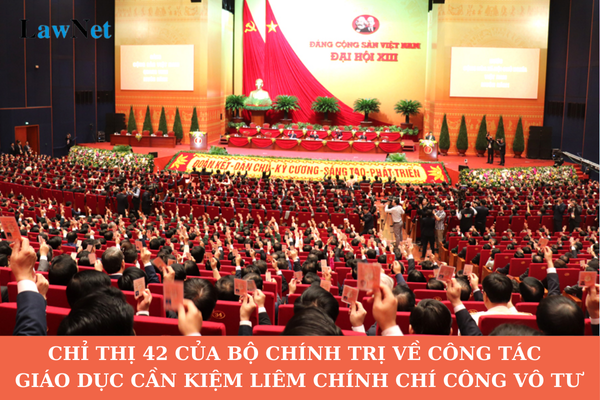What is the Directive 42 of the Politburo of Vietnam on diligence, thrift, integrity, and impartiality? Which CPV members are required to pay CPV membership fees?
Full Text of Directive 42 of the Politburo of Vietnam on Educational Work: diligence, thrift, integrity, and impartiality
On January 16, 2025, the Politburo of Vietnam issued Directive 42-CT/TW in 2025 to enhance the leadership of the Communist Party over educational work focusing on diligence, thrift, integrity, and impartiality.
Directive 42 of the Politburo of Vietnam clearly states that to enhance the educational work on diligence, thrift, integrity, and impartiality for officials and CPV members in the upcoming period, party committees and organizations need to focus on leading and effectively directing and implementing the following key tasks and solutions:
(1) Conduct widespread propaganda to make officials, CPV members, and people from all walks of life recognize that diligence, thrift, integrity, and impartiality are top moral qualities of a CPV member, official, and public employee, as well as the urgency of educating and practicing these qualities within the Communist Party, the political system, and society at large; enhance awareness and responsibility of party committees, organizations, government, and leaders in leading, directing, and implementing the Party's regulations, State laws on education, and practicing these qualities. Closely associate the education on diligence, thrift, integrity, and impartiality with the work of Party building and rectification, especially the cadre work, learning and following Ho Chi Minh's ideology, morality, and style, and implement the Party's regulations on the role model responsibility, on the revolutionary moral standards of officials, CPV members in the new phase.
Simultaneously implement four major guidelines: Promote education on diligence, thrift, integrity, and impartiality so as to "not want corruption, waste, and negativity" while tightening discipline, increasing inspection, monitoring, power control, and perfecting strict mechanisms so as to "not be able to commit corruption, waste, and negativity"; deal with violations without forbidden zones, no exceptions so as to "not dare commit corruption, waste, and negativity"; improve the living standards of officials, CPV members, public employees, workers so as to "not need corruption, negativity".
(2) Officials, CPV members, especially key officials, leaders, managers, and heads of party committees and governments at all levels must set an example in learning and practicing revolutionary moral standards in the new phase, especially in diligence, thrift, integrity, and impartiality: be dedicated, responsible, diligent, and devoted to the assigned work; live economically, not extravagantly or wastefully; maintain integrity, not engage in corruption or negativity, not cause inconvenience or harassment; be honest, straightforward, fair, and objective;
...
>> See the full content of Directive 42 of the Politburo of Vietnam here

What is the Directive 42 of the Politburo of Vietnam on diligence, thrift, integrity, and impartiality? Which CPV members are required to pay CPV membership fees? (Image from the Internet)
Which CPV members are required to pay CPV membership fees in Vietnam?
According to Section 1 of Part B from the regulations on CPV membership fee policies issued along with Decision 342/QD-TW in 2010, the following individuals are required to pay CPV membership fees:
(1) Communist CPV members in administrative agencies, political-social organizations, armed forces units;
(2) Communist CPV members receiving social insurance salaries;
(3) Communist CPV members working in enterprises, public service providers, economic organizations;
(4) Other domestic Communist CPV members (including members in agriculture, rural areas, student members...);
(5) Communist CPV members living, studying, or working abroad include:
- Communist CPV members working at Vietnamese representative agencies abroad; members who are international students under agreements sponsored by foreign countries or funded by the state budget;
- Self-financed studying abroad members; members working under labor export; members accompanying family, independent business-living members;
- Communist CPV members who are owners or co-owners of enterprises, commercial zones, service shops.
Note: Communist CPV members with particularly difficult circumstances, if they apply for exemption or reduction of CPV membership fee contribution, will be considered by the party cell, reported to the grassroots party committee for a decision.
What are regulations on management and usage of CPV membership fees in Vietnam?
According to Section 2 of Part B from the regulations on CPV membership fee policies issued along with Decision 342/QD-TW in 2010, the management and usage of CPV membership fees are regulated as follows:
- CPV membership fees retained at any level are used to balance the funding source for party work activities at that level. For district, town, and provincial party committees directly under the Central Government; Central Military Communist Party Committees, Central Public Security Committees, and the financial department of the Communist Party at the Central level, the retained CPV membership fee revenue is not included in the regular expenditure budget of the agency, unit but is set up as a reserve fund of the Communist Party at that level; the reserve fund is used to supplement the activities of the party committee, support operational funds for affiliated party organizations facing difficulties; the party committee decides the expenditures from the reserve fund.
- The party committees are responsible for compiling the situation of collection, submission, and usage of CPV membership fees of their levels and the entire party committee; preparing a report to the superior party committee. The Office of the Central Communist Party is responsible for aggregating the situation of collection, submission, and usage of CPV membership fees of the entire Communist Party, reporting to the Central Committee.

